| @wehaitians.com | |
No one writes to the tyrants | |
HistoryHeads/Not Just Fade Away |
| Correspond with us, including our executive editor, professor Yves A. Isidor, via electronic mail: |
| letters@wehaitians.com, or by way of a telephone, of which numer is: 617-852-7672. |
| Want to send this page or a link to a friend? Click on mail at the top of this window. |
|
 |
|
|
| Posted Wednesday, February 1, 2006 |
| A vote for Haitian presidential candidate, Preval, is a vote for more abject poverty, terrorism, drug trafficking - overall, anti-United States |
| Posted Sunday, January 29, 2006 |
| Freed Haiti priest in U.S. for treatment |
| By Denise Kalette, Associated Press Writer |
MIAMI, Jan. 29, 2006 - A politically influential Roman Catholic priest arrived in Miami on Sunday after Haiti's government granted him a temporary release from jail to be treated for leukemia and pneumonia.
The Rev. Gerard Jean-Juste will be treated at Jackson Memorial Hospital, said Ira Kurzban, an attorney who has worked with the cleric for years.
"I feel happy and grateful but I cannot forget the other political prisoners left behind," Jean-Juste told The Miami Herald. "It's a very tough situation for them. I hope my release is the opening of the freedom door."
Jean-Juste has been in prison on suspicion of involvement in the killing of prominent Haitian journalist and poet Jacques Roche. The 59-year-old priest has always denied the allegations.
Kurzban said Haiti buckled under public pressure to allow Jean-Juste to seek treatment in the United States.
"They certainly did not do this willingly and on their own," Kurzban said.
Amnesty International has labeled Jean-Juste, who supports ousted President Jean-Bertrand Aristide, "a prisoner of conscience." He has drawn comparisons to Aristide for his impassioned sermons and advocacy for the poor and has emerged as a prominent figure in the ousted leader's Lavalas Family party.
The Haitian government granted Jean-Juste a provisional release from jail for humanitarian reasons, said Michel Brunache, chief of staff of interim President Boniface Alexandre.
"His leukemia cannot be treated in Haiti," Brunache told the Associated Press. "After his treatment, he has to return to face justice."
A judge cleared Jean-Juste of homicide, but he is charged with weapons possession and criminal conspiracy — charges that the priest denies.
His arrival in Miami pleased Haitian-American activists. A small group of people had gathered at a community center in the city's Little Haiti neighborhood Sunday afternoon.
"It is very good news because we did get the report last week that he was very critical," said Jean-Robert LaFortune, chairman of the Haitian-American Grassroots Coalition. "There has been a community outcry here in Miami to have the prime minister of Haiti free him so he could get adequate care."
In Washington, State Department spokesman Kurtis Cooper said "We welcome the interim Haitian government's humanitarian decision to release Gerard Jean-Juste for the purpose of receiving medical treatment in the United States."
U.S. Sen. Richard Lugar (news, bio, voting record), R-Ind., chairman of the Foreign Relations Committee and a champion of Jean-Juste's, said he was delighted when he received a call from Haiti's interim Prime Minister Gerard Latortue telling him of the release.
The priest's supporters tried to register him as a presidential candidate last fall for the upcoming Feb. 7 elections, but authorities barred his candidacy because he was in prison.
___ Associated Press reporter Stevenson Jacobs in Port-au-Prince, Haiti, contributed to this report.
| Posted Friday, January 27, 2006 |
| Two missionaries, two Haitians kidnapped |
| By Stevenson Jacobs, Associated Press Writer |
PORT-AU-PRINCE, Haiti, Jan. 26, 2006 - Two French missionaries and two Haitians were kidnapped near a volatile slum in Haiti's capital, a U.N. official said Thursday.
The four were seized on Wednesday as they traveled on a road near Cite Soleil, a sprawling slum on the outskirts of Port-au-Prince used as a base by heavily armed gangs blamed for a wave of kidnappings and violence in the capital, said David Wimhurst, a U.N. spokesman.
The captors have demanded a ransom, and Haiti's anti-kidnapping squad was working to secure the hostages' release, said Wimhurst, who did not identify the two French nationals other than to say one was a priest and the other a nun. He said he had no information about the identities of the kidnapped Haitians.
A wave of kidnappings has plagued the Western Hemisphere's poorest nation, where criminal gangs have flourished in the aftermath of the rebellion that toppled President Jean-Bertrand Aristide in February 2004.
Last month, there were 162 reported kidnap cases in Haiti, and January has seen 37 so far, Wimhurst said.
The actual number is probably much higher because victims' families often prefer to negotiate with kidnappers rather than notify police.
With Feb. 7 national elections approaching, 9,000 U.N. soldiers and police have increasingly tried to gain control of Cite Soleil, home to 200,000 people living in squalor and a stronghold of armed gangs allegedly linked to Aristide.
| Posted Wednesday, January 25, 2006 |
| Imprisoned alleged terrorist Jean-Juste rejects deal |
| By Jaqueline Charles, Miami Herald Writer |
| jcharles@MiamiHerald.com |
A popular Roman Catholic priest and former Miami activist, sick with cancer in a Port-au-Prince jail, turned down a Haitian government offer that would have set him free.
Lawyers for the Rev. Gérard Jean-Juste, a Catholic priest jailed in Haiti who is reportedly suffering from leukemia, have turned down a government offer that could have allowed the former Miami activist to go free, both sides said Tuesday.
Interim Prime Minister Gérard Latortue told The Miami Herald the government offered the deal last week after a judge dropped murder and conspiracy charges against Jean-Juste but upheld a lesser charge of illegal weapons possession.
The deal, Latortue added, required Jean-Juste to agree to skip an appeal of the weapons indictment and submit to a fair and speedy trial. If convicted, the government would have commuted Jean-Juste's sentence.
But Jean-Juste and his lawyers refused, and on Friday appealed the indictment.
The appeals process could take months, Latortue said.''Now things are more complicated,'' Latortue said.
``Now it has to go to the appeals court; we wanted to avoid that.
''Supporters for Jean-Juste say it would have been ''preposterous'' for him to run the risk of trial under Haiti's decrepit judicial system.
''To go to trial would be a huge mistake,'' said Brian Concannon, a human rights lawyer who is leading an Internet campaign pushing for Jean-Juste's release.
``Why would he trust the government to do something difficult when they won't do something simple: The prosecutor only needs to write an order that says he's allowed to get out of jail to go to the United States for treatment.
''During a news conference in which Miami supporters announced plans to hold a Saturday vigil in support of Jean-Juste's release, several activists broke down in tears as the latest prison letter from Jean-Juste was read. For the first time, the always seemingly upbeat priest spoke of dying from leukemia.
''Unfortunately I will leave more work for you,'' Jean-Juste wrote. ``However, I believe God always arises new workers for his vineyard. Plus, from above, I'll be so busy meeting God's family members who enter heaven, so do not worry about me.
'Jack Lieberman, a Miami activist, said Jean-Juste's death would be ``at the hands of the Haitian government, and I am sad to say, the Bush administration. . . . They all are aware of the situation.
''But Latortue said the priest and his supporters had passed up a good opportunity to get him medical care.
''They want to make people believe we are trying to do something against him, and we just want to help the man,'' Latortue said.``
We have no interest, no willingness to keep that man in jail. We are actively looking for a solution to have him go free and get medical care.''
| Posted Tuesday, January 24, 2006 |
| U.S. does not want to send troops to Haiti |
| By Agence France-Presse |
WASHINGTON, Jan. 24, 2006 (AFP) - The United States sees no need to send troops to Haiti for peacekeeping duties ahead of elections scheduled in two weeks, State Department spokesman Sean McCormack said.
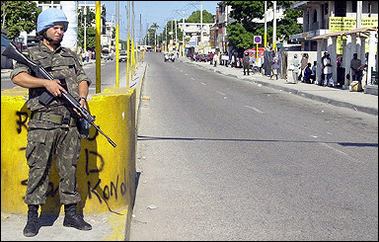 |
| A Brazilian soldier from the United Nations's Stabilization Mission in Haiti (MINUSTAH) is posted at the corner of a street in Port-au-Prince in 2004. AFP/File Photo |
"We believe MINUSTAH is doing a good job. We don't see the need for US troops there," he said, referring to the UN Stabilization Mission in Haiti.
McCormack was responding to a Washington Post editorial which called Tuesday for the United States to be more involved in the impoverished and violence-wracked Caribbean nation to support the democratic process.
"We believe that the 7,500-strong MINUSTAH forces are doing a good job," McCormack said.
"That isn't to say that there are not areas where security is an issue," he added, noting the sprawling Port-au-Prince slum of Cite Soleil, which has fended off UN peacekeeper efforts to quell violence there.
According to the Post, the Pentagon refused last year to assign a small rapid-reaction force to the Haitian government to help disarm the gangs which control the illicit drug trade in the country.
More recently, Washington rejected UN requests for five helicopters to support the February 7 election operations.
The newspaper noted that the US had sent navy warships to Liberia as a show of support for UN peacekeepers in that country.
"The administration's refusal to spare even a handful of helicopters or a few hundred marines for Haiti makes little sense when instability there is sure to raise the flow of refugees and drugs towards Florida," the Post said.
"Haiti has a slim chance to follow Liberia in establishing a legitimate government that can begin to restore order with the help of foreign troops and donors.
"But if the United States isn't willing to provide the military backup in the Caribbean as well as in West Africa, its success is unlikely."
McCormack denied that the US was turning a blind eye to Haiti's problems. "I take issue with this idea that somehow the United States has not been deeply involved and deeply concerned about what has been going on in Haiti. We have been and we'll continue to be.
"The problems in Haiti didn't develop overnight. And it is going to take some time for the Haitian people to turn the corner," he said.
| Hundreds march through Haitian sprawling slum |
| By The Associated Press |
PORT-AU-PRINCE, Haiti, Jan. 24, 2006 - About 300 protesters, including top gang leaders, marched Tuesday through a bullet-scarred slum on the edge of Haiti's capital, accusing U.N. troops of shooting civilians and demanding polling sites for Feb. 7 elections.
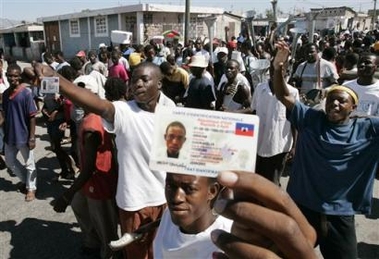 |
| Protesters hold new voter ID cards during a demonstration denouncing deadly attacks allegedly waged by U.N. troop and demanding a polling site for the Feb.7 Presidential elections in Cite-Soleil a slum in Port-au-Prince, Haiti on Tuesday, Jan.24,2006. (AP Photo/Ariana Cubillos) |
Chanting "We want peace!" and displaying their new voter ID cards, the protesters shuffled through Cite Soleil and past a U.N. military base.
Tensions have surged in the vast, seaside slum amid battles between armed street gangs and U.N. peacekeepers sent to restore order after a bloody revolt pushed former President Jean-Bertrand Aristide from power in February 2004.
U.N. officials say gangs use Cite Soleil as a base to carry out kidnappings in the capital, Port-au-Prince. Electoral officials have said they plan to move voting stations out of the slum as a security precaution.
People in the slum, a stronghold of Aristide allies, accuse peacekeepers of firing randomly during nighttime assaults.
"They treat us like animals, not humans. Kids walking down the street are getting shot everyday," said a gang leader known as General Tou Tou.
David Wimhurst, a U.N. spokesman, denied peacekeepers fired into the slum unprovoked.
"If we fire, it's because we're fired upon, and this is a daily occurrence," Wimhurst said.
| Posted Monday, January 23, 2006 |
| New U.N. commander promises secure Haiti |
| By Stevenson Jacobs, Associated Press Writer |
PORT-AU-PRINCE, Haiti, Jan. 23, 2006 - A Brazilian general took command on Monday of U.N. peacekeepers in Haiti, vowing to make the impoverished nation secure for elections on Feb. 7. He replaced another Brazilian who committed suicide.
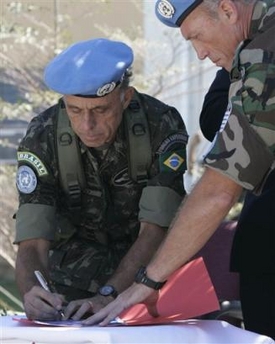 |
| New commander of the United Nations Stabilization Mission in Haiti (MINUSTAH) Brazilian Army Gen.Jose Elito Carvalho de Siqueira signs the agreement during a ceremony marking power transition of the Brazilian UN Commander in Port-au-Prince, Haiti, Monday, Jan.23, 2006. Gen. Jose Elito Carvalho de Siqueira replaces Brazilian Lt. Gen. Urano Teixeira da Matta Bacellar, who committed suicide in his hotel room in the Haitian capital,on Jan.7. (AP Photo/Ariana Cubillos) |
Gen. Jose Elito Carvalho de Siqueira said the 9,000-strong U.N. force was up to the task but that he would need the help of Haiti's 8 million people.
"I'm sure that we will provide the natural security for elections and after the elections," de Siqueira said after he took command. "We are here to help you and we know how to help you, but we are not enough. We must have a lot of support from other parts of the country — political, economic and social."
De Siqueira, 59, was previously based in Salvador, a city in northeastern Brazil. He replaces Lt. Gen. Urano Teixeira da Matta Bacellar, who shot himself in his hotel room in the capital, Port-au-Prince, on Jan. 7.
The special U.N. envoy to Haiti, Juan Valdes, said the general arrived "at a crucial time," coming before "one of the most important elections in recent history."
Haiti's interim government said voter ID cards have been distributed to 85 percent of the 3.5 million people registered to vote. Thirty-five candidates are running for president and hundreds more for 129 legislative seats.
The U.N. force was sent to help restore democracy after a bloody revolt forced then-President Jean-Bertrand Aristide from power nearly two years ago. Since then, peacekeepers have waged frequent gunbattles with well-armed street gangs blamed for a wave of kidnappings and killings in the capital.
Two Jordanian troops were gunned down last week at a checkpoint in Cite Soleil, a violent slum on the edge of the capital teeming with loyalists of Aristide.
Residents there accused Jordanian peacekeepers of returning days later and firing into the area, killing four civilians — a charge the U.N. has denied.
De Siqueira said his troops would respect civilians. "We are here to give people security, not to fight," he said.
More than 1,500 people — including 78 police officers and nine U.N. peacekeepers — have died in violence since Aristide fled Haiti in February 2004, local human rights activist Pierre Esperance said.
| Posted Sunday, January 22, 2006 |
| INTERVIEW - Haiti alleged terrorist priest to remain under secured locks, fears for his life |
| By Joseph Guyler Delva, Reuters Writer |
PORT-AU-PRINCE, Haiti, Jan 22 (Reuters) - A jailed Haitian priest and former adviser to ousted President Jean-Bertrand Aristide says he was cleared of murder but indicted on weapons charges in a bid to keep him in prison and out of politics.
Popular Roman Catholic priest Gerard Jean-Juste has been jailed for more than six months by Haiti's interim government, which accused him of involvement in the July killing of prominent journalist Jacques Roche.
In a telephone interview from his prison cell late on Saturday, Jean-Juste told Reuters a judge cleared him of the murder late last week but indicted him instead on illegal weapon and "criminal gang" activity charges.
Jean-Juste also denies the new accusations and says he desperately needs medical attention to treat his leukemia.
"My life is in danger. I've lost consciousness several times. I'm in a very bad shape," he said. "I hope the government will give me the permission to travel to get medical treatment, because such treatment is not available in Haiti."
Amnesty International calls Jean-Juste a prisoner of conscience jailed for expressing his views and members of the U.S. Congress have also called for his release.
Widely viewed as the natural successor to fellow priest Aristide, who was ousted by an armed revolt in February 2004, Jean-Juste said the government had always wanted to jail him because they believed he wanted to become president. He denies any presidential ambitions, however.
A presidential election was originally scheduled for November. It is now due to take place on Feb. 7 after repeated delays caused by incompetence, violence and logistical problems in the poorest country in the Americas.
Jean-Juste, who served as a spiritual adviser to Aristide and was deeply involved in his Lavalas movement, said he would fight the new charges.
"I absolutely have nothing to do with criminal gang activities. I've never carried a weapon, I've never used one and I don't have weapons," he said.
Weapons and violence have proliferated in Haiti as it lurches toward its first national elections since 2000. The country, which shares the Caribbean island of Hispaniola with the Dominican Republic, is patrolled by United Nations peacekeepers and still struggling to establish a stable democracy after decades of dictatorship and military rule.
Once a hero of Haitian democracy, Aristide was accused of despotism and corruption in his second term and was forced into exile in South Africa. A Haitian council of elders appointed an interim government under Gerard Latortue, a Florida business consultant and former U.N. official who became prime minister and has ruled without a parliament.
Jean-Juste noted that presidential candidate Dany Toussaint had recently been caught carrying an illegal weapon but was allowed to go free.
"In Dany Toussaint's case, the corpus delicti was there, they let him go anyway," he said. "In my case there is no corpus delicti, but they want to keep me in jail."
| Haitian presidential hopeful who told The Associated Press that he was a total failure decries gap between rich and poor |
| By Agence France-Presse |
PORT-AU-PRINCE, Jan. 21, 2006 (AFP) - Haiti's elites must do more to help the poor, the frontrunner in Haiti's presidential race told AFP in an interview.
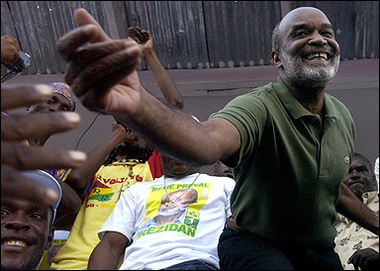 |
| A CRIMINAL,. A TOTAL FAILURE, A DRUNKARD Haitian presidential hopeful Rene Preval (Agence France-Presse) |
"If those who have, begin to invest in the education of the weakest among us, they would be grateful," said former president Rene Preval, who leads opinion polls ahead of the February 7 election.
"Children must be taken off the streets. Weapons must be taken from the hands of children and replaced with pens and books," he said late on Friday. "That is how we will harmonize relations between rich and poor."
Cite Soleil, a sprawling slum in the capital that is controlled by armed groups, represents the failure of the country's elites, he said.
"We must realize it," he said. "The rich are cloistered in their walled villas and the poor are crammed into slums and own nothing. The gap is too big," he said.
Preval opposed a military solution to the problems posed by Cite Soleil, the source of much of Haiti's ongoing insecurity.
"I am against a military solution to this problem," he said in an interview late Friday, proposing dialogue, "intelligence and firmness" instead.
Preval called for judicial reform, the expansion of Haiti's 4,000-strong police force and for the UN Stabilization Mission in Haiti (MINUSTAH) to remain in place until Haitians can ensure stability themselves.
"Those that want to create instability in the country and to continue drug trafficking will be the first to demand MINUSTAH's departure. They will wave the flag to demand that they go," he said.
"I'm not going to take a falsely nationalist stance. MINUSTAH should leave as soon as possible, but when we ourselves are ready to assume responsibility for security," he said.
Preval was Haiti's president from 1996-2001 and served as prime minister for former president Jean Bertrand Aristide in 1991.
MINUSTAH has faced mounting criticism in recent weeks over its attempts to establish order in the country.
Nine soldiers in the UN force, four of them Jordanians, have been killed since it was deployed in June 2004, four months after Aristide fled a popular uprising.
On top of increasing violence, uncertainty in the poorest nation in the Americas has mounted as the long-awaited election to find a replacement for Aristide has been postponed four times.
| Posted Saturday, January 21, 2006 |
| Haiti judge drops charges against priest |
| By Michael Norton, Associated Press Writer |
PORT-AU-PRINCE, Haiti, Jan. 20, 2006 - A judge dropped charges against a politically influential Catholic priest in the death of a journalist, but indicted him on two lesser counts, the cleric's lawyer said Friday.
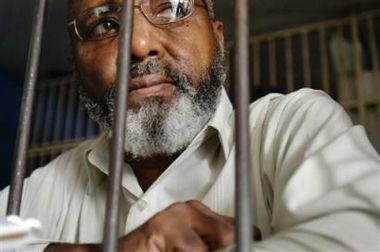 |
| Pro-Aristide Rev. Gerard Jean-Juste talks to the Associated Press from a cell at the Petionville police station in Port-au-Prince, Haiti, in this July, 22, 2005 file photo. A judge dropped charges against the politically influential Catholic priest in the death of a journalist, but indicted him on two lesser counts, the cleric's lawyer said Friday Jan. 20, 2006. (AP Photo/Evens Sanon/File) |
The Rev. Gerard Jean-Juste, a supporter of ousted President Jean-Bertrand Aristide, has been in prison since July in connection with the killing of the prominent Haitian journalist and poet Jacques Roche.
The 59-year-old priest had always denied the allegations.
Jean-Juste, who has drawn comparisons to Aristide for his impassioned sermons and advocacy for the poor, has emerged as a prominent figure in the ousted leader's Lavalas Family party.
The priest's supporters tried to register him as a presidential candidate last fall, but authorities barred his candidacy because he was in prison.
Mario Joseph, the priest's lawyer, said the court dropped the homicide charges but indicted the priest on weapons possession and conspiracy charges.
Jean-Juste remains in prison with no court date. His supporters, meanwhile, have for said several months that he has cancer and should be allowed to travel to the United States for treatment.
On Friday, a high-level international delegation that included U.S. Undersecretary of State Thomas Shannon arrived in the Haitian capital of Port-au-Prince to press authorities to hold elections as scheduled on Feb. 7.
Elections have already been postponed several times because of organizational problems, mounting chaos and violence.
| Posted Friday, January 20, 2006 |
| After 29 days, Haitian Norwich woman regains liberty from Immigration and Customs Enforcement |
| By Brian Wallheimer, Norwich Bulletin Writer |
BOSTON, Jan. 19, 2006 -- After 29 days in jail, waiting to being deported to Haiti, Roselie Desardouin was quietly released Thursday and went home.
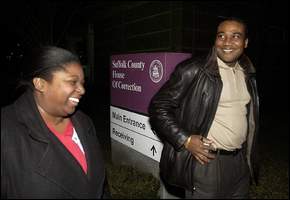 |
| Audin Desardouin and his wife, Rosalie, leave Suffolk County House of Correction Thursday in Boston after the deportation of the jailed Norwich woman was withdrawn. (John Sishmanian/Norwich Bulletin) |
The U.S. Citizenship and Immigration Service approved a waiver Thursday morning that will disregard fraud charges pending against the Norwich woman and allow her to re-apply for permanent residency. She came to the United States in 1990 with fraudulent visa papers and has been going through deportation proceedings since.
Roselie Desardouin called the month she spent locked up "a nightmare." She hugged her husband as she was released at about 5:20 p.m.
"I can't wait to see my kids," she said before the two stepped into a car and sped away.
Desardouin's husband, Audrin, enlisted the help of Norwich city officials, family members, Connecticut's Congressional delegation and community members to fight the deportation. It was dozens of letters from those people that caused immigration officials to grant Roselie a waiver, disregarding the fraud because of the hardship her deportation would have on her family.
"I feel good she's out because I've gone through so much," Audrin Desardouin said. "I appreciate the good work that they did as the officials from the city of Norwich."
Shawn Saucier, a spokesman with the Citizenship and Immigration Service, said Roselie Desardouin will now be able to apply for a green card.
"The event of her committing fraud to enter the U.S. has been lifted," Saucier said. "If there's anything else preventing her (from getting a green card), I don't know."
Roselie Desardouin said she was shocked when Immigrations and Customs Enforcement took her into custody Dec. 22 during a monthly check-in.
"I went through a lot of humiliation because you don't really know why you're in there," she said. "You just sit around all day."
She quickly got on the phone to her children, Fanchley, 10, and Francesca, 12, the first contact she has had with them since her arrest.
"I'll be home soon. I love you," she told them.
The Desardouins' attorney, William Anastasi, said Roselie stands a good chance of getting permanent residency. He said it is rare that a deportation is reversed at this stage.
"It's getting harder and harder. The laws are getting tough," Anastasi said. "What really helped in this case was the community support."
U.S. Sen. Christopher Dodd, D-Conn., applauded the release.
"This is wonderful news. I'm very happy for Roselie, Audrin and their children," Dodd said. "It never made any sense to split up this family and I commend the U.S. Citizenship and Immigration Services office for reconsidering and ultimately reversing their decision."
Reach Brian Wallheimer at 425-4241 or bwallheimer@ norwichbulletin.com
Originally published January 20, 2006 .
-- Source: U.S. Citizenship and Immigration Service.
Copyright ©2006 Norwich Bulletin
| Posted Thursday, January 19, 2006 |
| Haiti violence kills four as humanitarian group urges gangs to respect civilians |
| By Michael Norton, Associated Press Writer |
PORT-AU-PRINCE, Haiti, Jan. 19, 2006 – Four people were shot to death Wednesday and Thursday in the latest surge of violence in Haiti's largest slum.
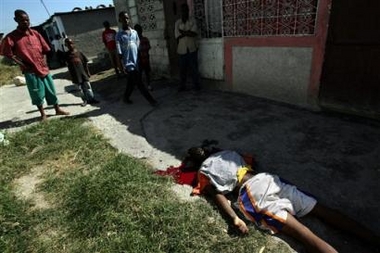 |
| A Haitian man lies dead in a pool of blood on a day in which four people were killed and seven wounded in the Cite Soleil slum of Port au Prince, Haiti, Thursday, Jan. 19, 2006. Angry residents blamed the killings on Jordanian peacekeepers who they alleged had earlier fired high-power weapons from armored vehicles that blew large holes through cynderblock dwellings. (AP Photo/Brennan Linsley) |
The three men and a woman were killed Wednesday night and early Thursday in the Port-au-Prince slum of Cite Soleil, authorities at Cite Soleil's St. Catherine Hospital said. Seven others were injured.
Residents blamed the killings on Jordanian peacekeepers who they said sprayed the area's cinderblock homes with high-powered weapons. U.N. spokesman Damian Onses-Cardona said he had no report on any troop offensives in Cite Soleil since Tuesday and said peacekeepers don't open fire unless attacked.
Residents said one victim was a man in his 30s who ran a business carrying goods with a wheelbarrow. His body lay on a walkway Thursday as onlookers showed journalists high-caliber weapon rounds they said were fired by U.N. troops.
The 9,000-strong U.N. force is struggling to restore order ahead of the country's repeatedly postponed elections, now set for Feb. 7, and has clashed often with well-armed street gangs blamed for kidnappings and killings.
Two Jordanians were gunned down at a Cite Soleil checkpoint on Tuesday.
Meanwhile, the humanitarian group Medecins Sans Frontieres, or Doctors Without Borders, said Haiti's violence was increasingly targeting women, children and the elderly. It said it had treated 2,500 people for gunshot or stab wounds at a single trauma center in the last year.
More than 1,500 people – including 78 police officers and nine U.N. peacekeepers – have died since former President Jean-Bertrand Aristide fled Haiti in February 2004, local human rights activist Pierre Esperance said.
Elections have been postponed several times because of organizational problems and violence.
| After rally, letters, Haitian Norwich woman gets immigration waiver |
| By The Associated Press |
NORWICH, Conn., Jan. 19, 2006 -- A Norwich woman facing deportation to her native Haiti was granted a waiver Thursday that will allow her to stay in the country after the city of Norwich rallied around her, her attorney and U.S. Sen. Christopher Dodd said.
Attorney William Anastasi said he received word Thursday morning that Roselie Desardouin was to be released later Thursday from Suffolk County Jail in Boston, where she has been held since Dec. 22 by U.S. Citizenship and Immigration Services.
Desardouin's husband, Audrin, planned to pick her up in Boston, Anastasi said. The waiver means she will be able to pursue her application for a green card.
She entered the country illegally 15 years ago and has been charged with fraud based on a series of paperwork problems. Audrin Desardouin is a naturalized U.S. citizen, and the couple's daughter, Francesca, 12, and son, Fanchley, 10, are U.S. citizens.
Anastasi submitted 60 letters in an effort to demonstrate that deporting Desardouin would cause a hardship for Desardouins family.
"She had come with a fraudulent document years and years ago, and we were trying to overcome that by demonstrating a hardship," Anastasi said. "The community really came through for her and I felt that helped tilt the balance."
The Norwich Bulletin and The Day of New London reported that the letters sent to the federal government included one from Francesca.
"How can you let her go?" Francesca wrote. "She never did anything wrong to you. For sure you guy have a heart to let my mother stay. For 15 years my mother has been try to get a green card and you won't give her one. She has done nothing to the state. You'll soon will discover that if you send her to Haiti you made a wrong decision. So please let my mom come back home."
| Lawyers ask immigration judges to halt deportations to Haiti |
| By Jennifer Kay, Associated Press Writer |
MIAMI, Jan. 19, 2006 — Karline St. Louis fears her 4-year-old son may grow up without his father.
She and her son Rayvin are both U.S. citizens living in South Florida, but her husband Kevin is being held in an Arizona immigration prison, facing immediate deportation to his native Haiti.
Kevin St. Louis was among the hundreds of Haitian immigrants nationwide whose attorneys Thursday requested immigration judges halt deportation proceedings against their clients to avoid returning them to a country wracked by political turmoil, violence and devastating natural disasters.
St. Louis, who fled Haiti by boat more 12 years ago looking for work, is fighting to stay in the United States. If deported, immigration laws would bar him from re-entering the United States for ten years.
"He's scared they might kill him. From here when you go to Haiti, they think you have money. And if he does get kidnapped, I don't have that kind of money to pay to release him," Karline St. Louis said.
The deportations put individuals at risk for rape, starvation and murder, among other human rights abuses that Haiti's interim government is unable to stop. Deportations tear apart families and could worsen Haiti's strife by cutting off the money supply immigrants send to help their relatives survive, the attorney's said.
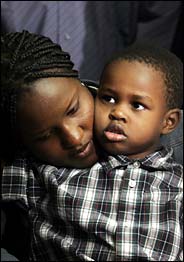 |
||
|
"What we are asking the government to do is to temporarily stop the deportations to give Haiti some time recoup, to settle the internal conflicts," said Ariol Eugene, a Miami attorney who said he would be filing the motion on behalf of 50 clients through next week.
Simultaneous motions were filed in Miami, Boston, Philadelphia, New York and Washington.
"Current circumstances — including devastating natural disasters with ongoing repercussions, brutal civil strife, documented bloody political conflict, indisputable countrywide insecurity and proven inability of the Haitian state (even with the help of United Nations international troops) to protect its own people — warrant the extraordinary relief requested," the motion states.
Haiti's presidential elections, set for Feb. 7, have been postponed several times because of organizational problems and violence. Since Tuesday, gunmen have shot and killed six people, including two Jordanian U.N. peacekeepers, and wounded a third peacekeeper in the country's capital, Port-au-Prince.
Medecins Sans Frontieres, the French humanitarian group, said Thursday it had treated 2,500 people for gunshot or stab wounds at one trauma center in Haiti in the last year. Besides the political instability in Haiti, more than 10,000 people have been killed in recent years from hurricanes and floods that triggered massive landslides.
The motion also criticized the Department of Homeland Security's decision not to grant Haitians the "Temporary Protected Status" that allows immigrants fleeing civil strife or natural disasters to remain in the United States.
Temporary protected status has been granted to immigrants from Honduras, El Salvador, Nicaragua and a handful other Central American and African countries.
"All these countries have a temporary halt to deportations because it is immoral to deport anyone to such conditions. Why aren't Haitians good enough for such basic protections?" said Steve Forester, an attorney and senior policy advocate for Haitian Women of Miami.
The U.S. government is closely monitoring the situation in Haiti, said Dan Kane, a Washington-based spokesman for U.S. Citizenship and Immigration Services.
Kane said the Department of Homeland Security may designate a country for temporary protected status if the safety of returning citizens is threatened by ongoing armed conflict, an environmental disaster that substantially disrupts living conditions or "extraordinary or temporary conditions" that may that prevent the safe return to that country.
"We don't feel at this time that Haiti fulfills the very narrow criteria provided by Congress," Kane said.
The 2000 Census estimated about 531,000 Haitians live in the United States.
Thomas Griffin, a Philadelphia attorney who filed the motion on behalf of three clients Thursday, said between 200 and 300 attorneys nationwide have inquired this week about filing the motion for their clients.
More than a dozen national religious and immigrant organizations supported the motion.
"I believe that racism is at the root of this because if there is any country that qualifies for TPS, it is Haiti. We've met all the criteria and beyond. We've suffered natural disasters, we suffered political disasters and now we have a country at the brink of civil war," said Marleine Bastien, executive director of Haitian Women of Miami, an immigration advocacy and social services agency.
| Posted Tuesday, January 17, 2006 |
| Brazilian to lead U.N. peacekeepers in Haiti |
| By The Associated Press |
BRASILIA, Brazil, Jan. 18, 2006 (AP) -- A Brazilian general will assume the command of the U.N. peacekeeping operations in Haiti, replacing another Brazilian general who committed suicide earlier this month, the government said.
Gen. Jose Elito Carvalho de Siqueira, 59, a three-star general who commands the army's 6th Military Region in the northeastern city of Salvador, was offered the command after meeting with U.N. Secretary-General Kofi Annan, Brazil's foreign and defense ministries said Tuesday in a joint statement.
"Annan's decision confirms the United Nations' recognition of Brazil's contribution to the [peacekeeping] mission," the statement read. It did not say when de Siqueira would arrive in Haiti or how long his command would last.
De Siqueira will replace Lt. Gen. Urano Teixeira da Matta Bacellar, who was found dead of a gunshot wound January 7 in his hotel room in Haiti's capital of Port-au-Prince. Brazilian and U.N. forensic specialists later concluded he had committed suicide.
De Siqueira will take charge of 9,000 peacekeeping troops from more than 40 countries sent to help restore democracy two years after a rebellion overthrew President Jean-Bertrand Aristide.
Brazil's command of U.N.'s peacekeeping forces in Haiti has been a key point in the country's foreign policy, which is heavily focused on giving Brazil a permanent seat on the U.N. Security Council.
| Preval says he's not guided by Aristide |
| By Michael Norton, Associated Press Writer |
PORT-AU-PRINCE, Haiti, Jan. 17, 2006 - Haiti's front-running presidential candidate said Tuesday that he has emerged from the shadow of ousted President Jean-Bertrand Aristide, his former mentor who fled Haiti amid a rebellion and accusations of corruption.
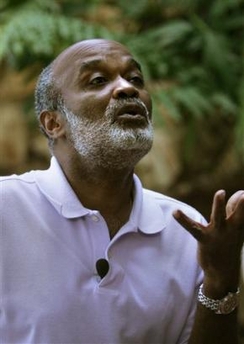 |
| Front-running Haitian presidential candidate Rene Preval gestures during an interview at a private home in Port au Prince, Tuesday, Jan. 17, 2006. Preval asserted Tuesday that, if elected, he thinks he can begin to pull Haiti's people out of the hemisphere's worst poverty. (AP Photo/Brennan Linsley) |
"I don't want to be compared with Aristide or with anybody else. I want to be compared with myself," Rene Preval told The Associated Press in the first interview he has given since he declared himself a candidate.
Elections, set for Feb. 7, have been postponed several times because of organizational problems and violence. There was more bloodshed Tuesday as gunmen shot and killed two Jordanian U.N. peacekeepers and wounded a third in the Cite Soleil slum, a stronghold of Aristide supporters. It was the bloodiest day for the 9,000-member peacekeeping force since being deployed in June 2004.
Preval was elected president in 1995 and served until 2001.
Many Haitians fear that if Preval wins the presidency again he will bring Aristide back from exile in South Africa. Preval, who turned 63 on Tuesday, insisted he will govern without being influenced by Aristide.
Aristide was Haiti's first democratically elected leader since the Caribbean country won independence from France in 1804, but was accused by opponents of masterminding attacks by armed gangs and breaking promises to the poor. Aristide has denied both.
Preval, who has never been a member of Aristide's Lavalas Family Party, expressed concern about Haiti's violence. Pointing out the electrified wire and high walls surrounding his home, Preval said: "Fear has isolated everybody."
Since the February 2004 rebellion, the situation in the Western hemisphere's poorest nation has not improved despite the presence of a U.N. peacekeeping force charged with providing security and ushering in elections to restore democracy.
Kidnappings have engulfed Haiti's capital, snaring ordinary Haitians as well as international election workers and journalists.
Preval said the U.N. mission "should stay as long as it is necessary" to re-establish security. Aristide, by contrast, has compared the U.N. mission to French troops that invaded Haiti in 1802 to re-establish slavery.
Preval followed Aristide into exile after a bloody 1991 coup and returned to Haiti during the U.S. military intervention that restored Aristide to power in 1994. In his 1996 inaugural address, Preval promised to turn Haiti into "a vast construction site" and "re-establish the authority of the state." He now acknowledges he failed, but said "we didn't steal and we didn't violate human rights."
| UN police chief attacks global inaction on Haiti drug wars |
| By Mark Turner, Financial Times/Americas Writer |
JANUARY 18, 2006 - The situation in Haiti's Cite Soleil slum now resembles the worst drugs wars in Los Angeles' history yet the outside world is failing to muster the will or resources to stop it, the United Nations' top policeman has warned.
The bleak prognosis by Mark Kroeker, a former deputy police chief in Los Angeles, was made as elections were further delayed amid mounting violence in the western hemisphere's poorest country.
"Cocaine, guns and gangs," Mr Kroeker told the FT. "When crack cocaine arrived in the street gangs of south LA [in the mid-70s], it was the beginning of a whole new world. The accessibility of weapons by gangsters, the drug trade that fuelled their financial needs, and then staking out territories. This is Cite Soleil."
Moreover, the UN's peacekeeping force, including 1,700 policemen, is frequently in the line of fire. In December Mark Bourque, a Canadian police officer, was shot dead near Port-au-Prince's Cite Soleil; yesterday two Jordanian peacekeepers were killed and one was in serious condition after an attack on a checkpoint, the UN said. New weapons are said to be pouring in and kidnappings are rampant. Last week peacekeepers clashed with amob protesting against human smuggling deaths.
Lt Gen Urano Teixeira da Matta Bacellar, the force commander, died early this month, reportedly having committed suicide. Kofi Annan, the UN secretary-general, hit out this week at a "defamation campaign" being waged against the mission.
But with international attention focused on events in the Middle East, Haiti's plight has barely registered. That would appear a dangerous mistake. The CIA calls Haiti a "major Caribbean trans-shipment point for cocaine en route to the US and Europe", favoured by Colombian narcotics traffickers for illicit financial transactions.
The US's Drug Enforcement Administration says: "Haitian drug traffickers, utilising maritime shipments to transport cocaine to south Florida, are becoming a major threat."
Mr Kroeker, who saw some of LA's most dramatic upheavals, served in the Balkans and Liberia. He speaks with 40 years' experience.
"[In LA] we used to say, 'I need to take back this neighbourhood and give it back to the people who live there.' The same could be said in Cite Soleil ... The gun, drug and gangster leadership connection has to be dismantled." He says the organised nature of the drug gang leadership "would bespeak a military holdover, to some form of lines of authority ... It's not so diffuse - you can track the leadership lines to key leaders."
But the Haitian national police is grossly underequipped and the UN is struggling to raise the resources and assets to transform it from an agency of oppression to a capable, well-led community service.
"No bird in the air. No technology for listening to anybody. No money to pay informants. No skilled people to work the boats and put the aircraft out watching the landings and take-offs. No radar," says Mr Kroeker. The boats the police do have lack fuel.
"This is a fantasy island for drug dealers," he says.
Kenneth Payumo, a UN mission management officer, adds: "Anything could be travelling through Haiti."
So why the apparent lack of interest? The police mission is underfunded, Mr Kroeker. says: "If they care why isn't there more of a co-ordinated police development approach to build the nation's inherent resistance to this problem?
"The big missing ingredient is the will of our donor countries to do something about it. Unless the countries who give, give us some equipment and goods, all of this is shallow and useless."
Financial Times Ltd 2006
| Two UN peacekeepers from Jordan killed by gunfire in Haiti |
| By Bill Varner, Blooberg News |
UNITED NATIONS, Jan. 17, 2006 (Bloomberg) -- Two Jordanian soldiers with the United Nations peacekeeping mission in Haiti died today and a third was seriously wounded when they were shot near the Cite Soleil slum in the capital, Port-au-Prince.
UN spokesman Stephane Dujarric said the soldiers were at a vehicle checkpoint near the slum, which is largely controlled by armed gangs attempting to disrupt elections set for Feb. 7. The deaths bring to 10 the number of peacekeepers who have been killed in action since the UN mission was formed in April 2004.
Haiti, the poorest country in the Western Hemisphere, has depended on UN, U.S. and other foreign troops for security since Jean-Bertrand Aristide was forced from the presidency during a rebellion in April 2004. The UN has almost 9,000 soldiers and civilian policemen in Haiti.
The Jordanians were attempting to enlarge the checkpoint by adding additional lanes when they came under fire, the UN mission in Haiti said. Up to 500,000 Haitians live in Cite Soleil, the last stronghold of armed gangs, some loyal to Aristide.
To contact the reporter on this story: Bill Varner at the United Nations at wvarner@bloomberg.net
| Wehaitians.com, the scholarly journal of democracy and human rights |
| More from wehaitians.com |